现在完成时态
图片预览
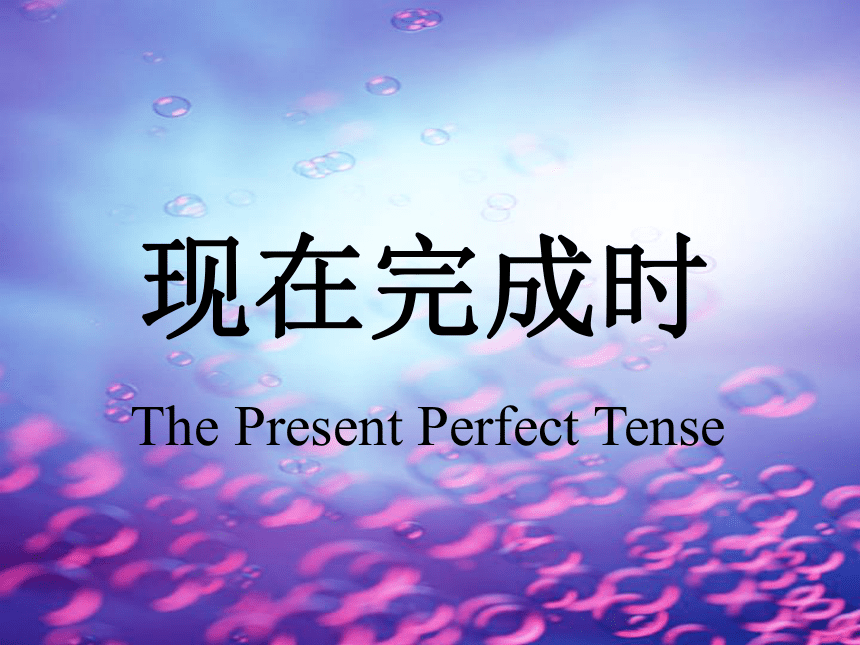
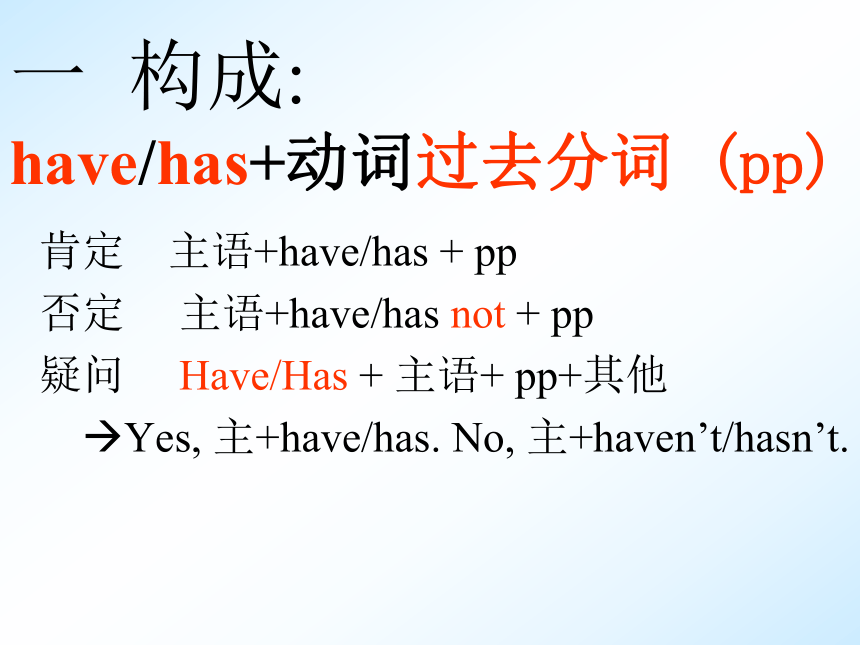
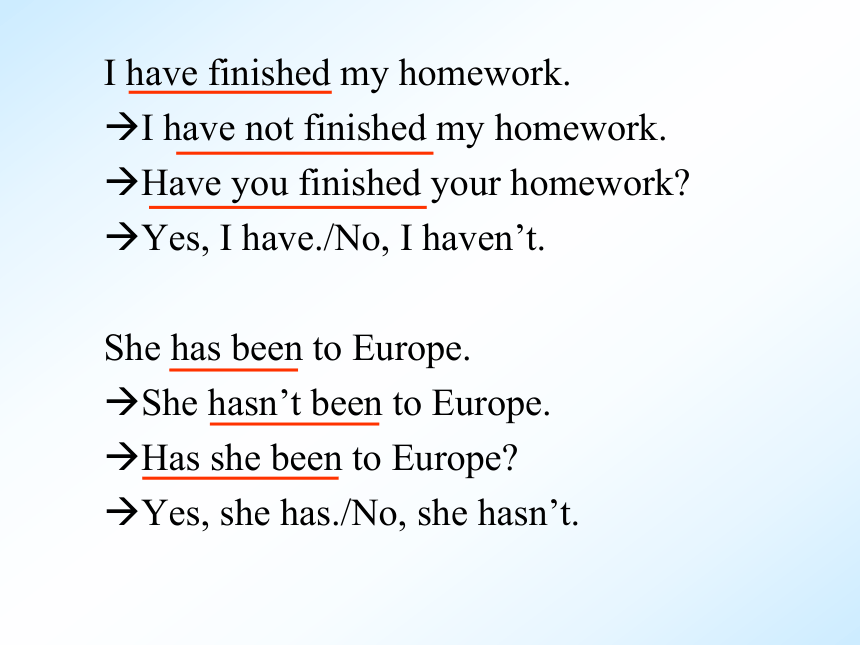
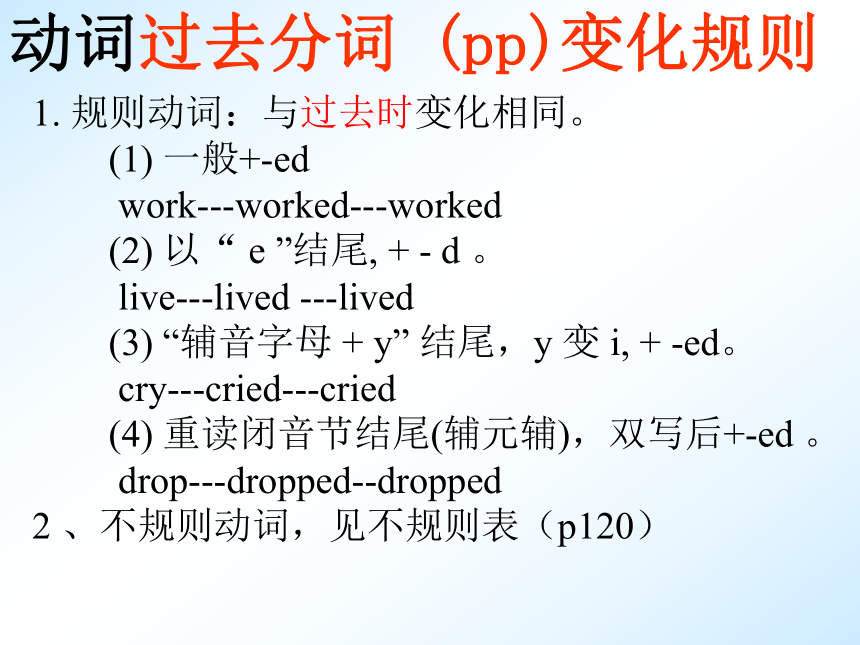

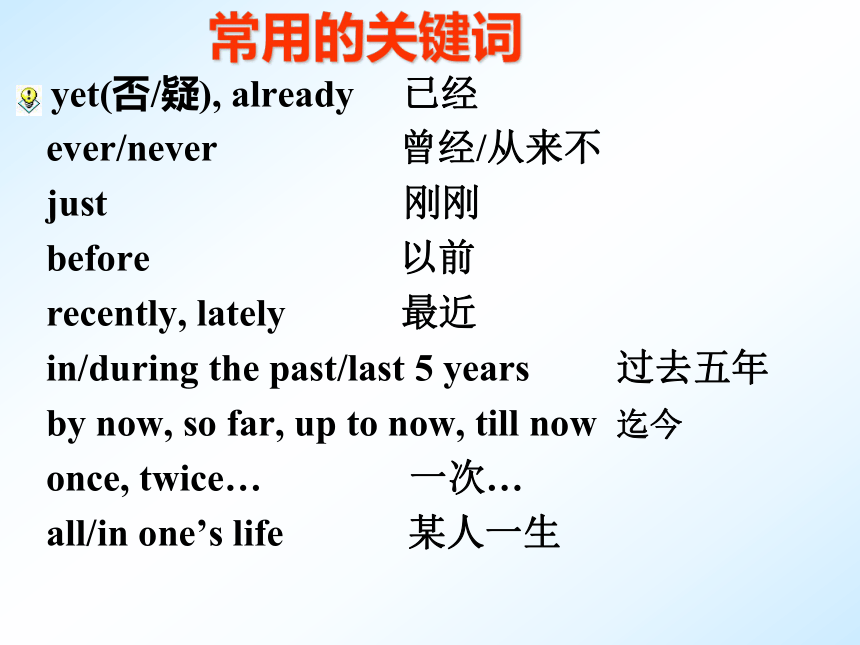
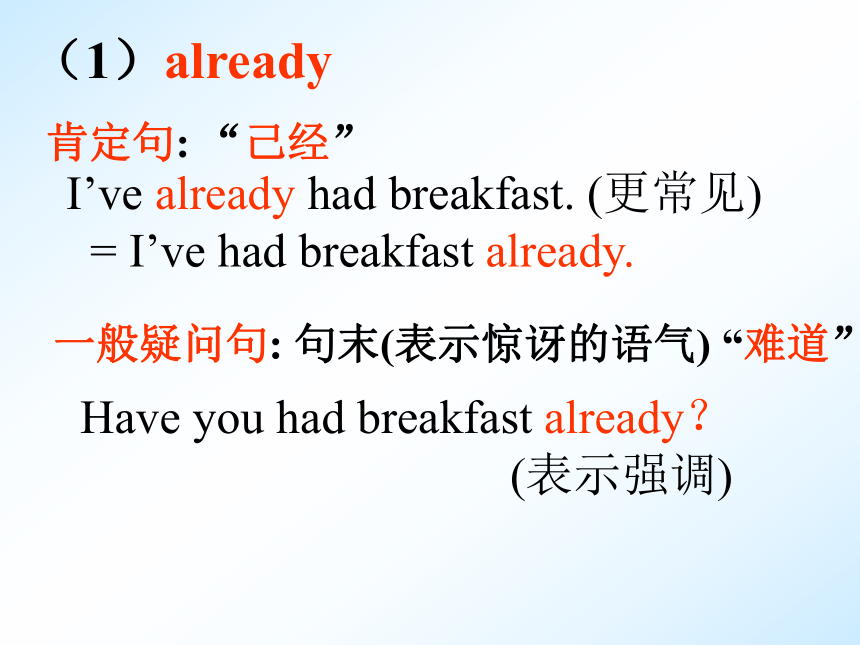
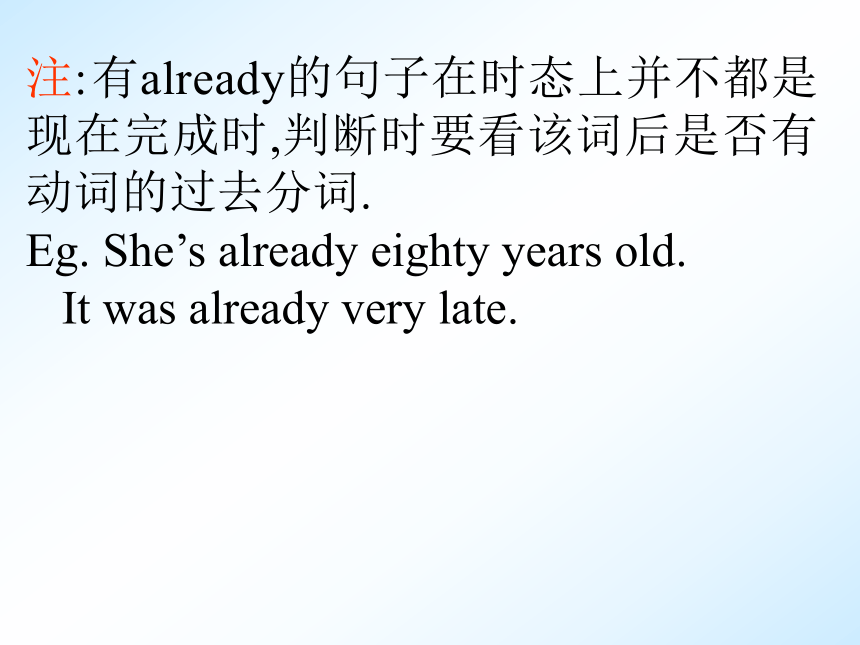
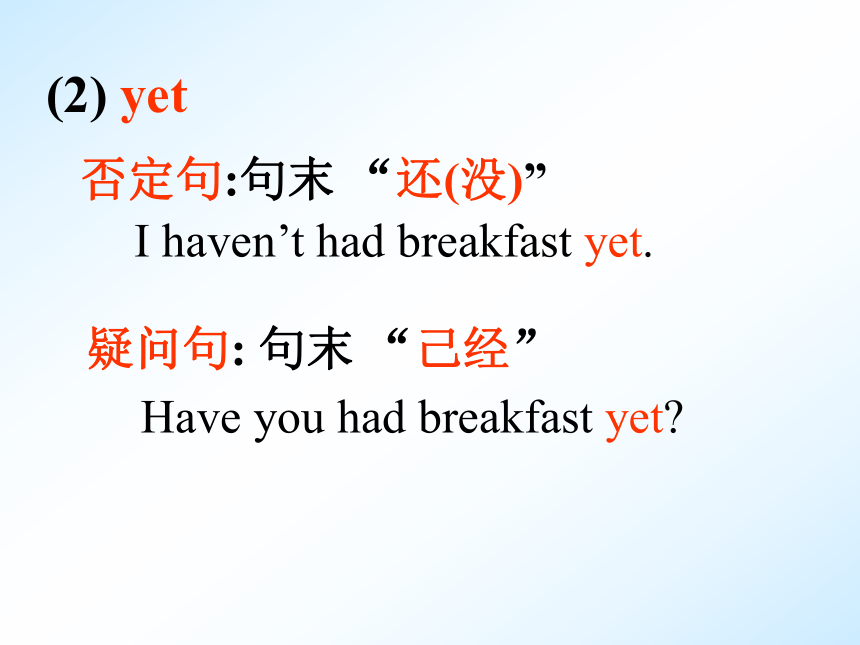
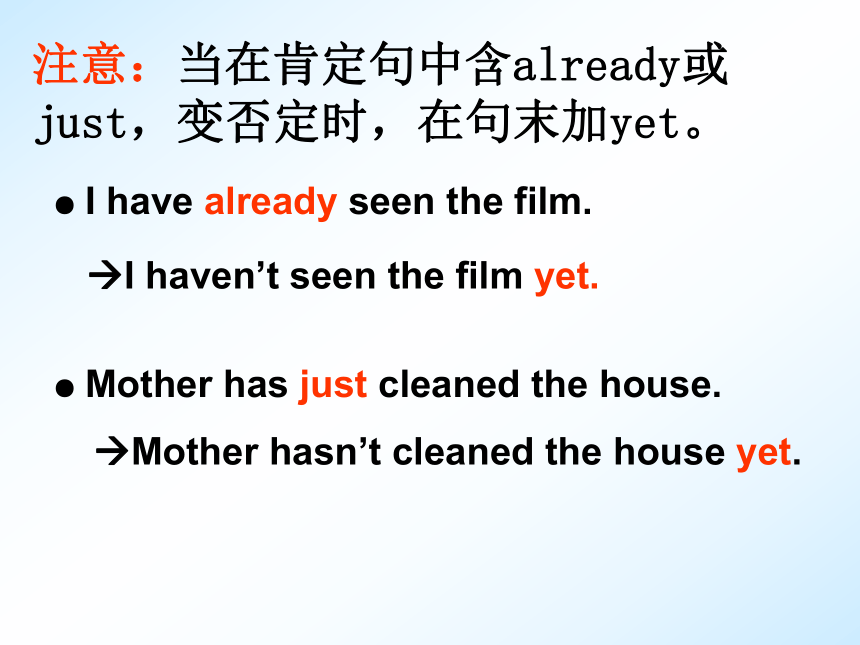
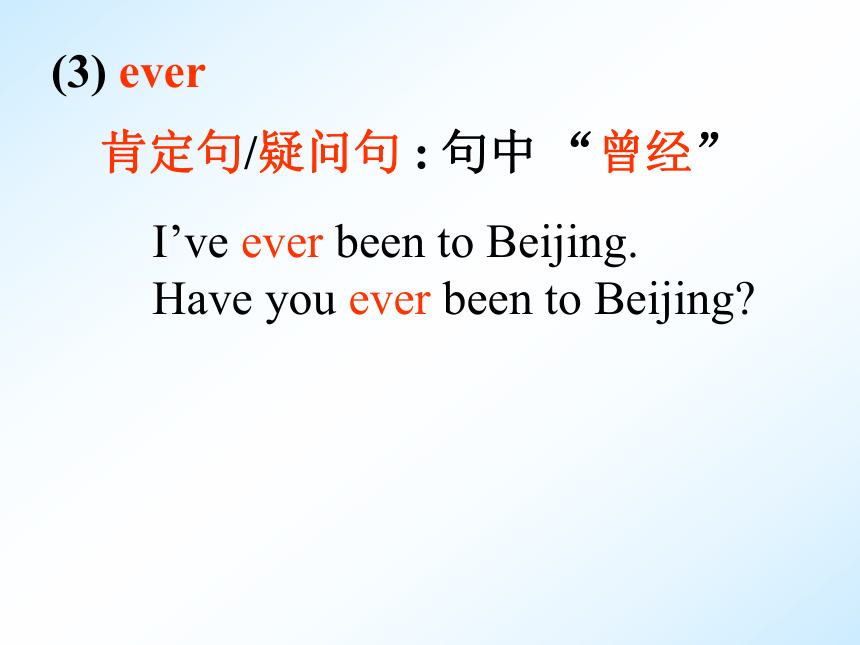

文档简介
课件66张PPT。现在完成时 The Present Perfect Tense一 构成:have/has+动词过去分词 (pp)肯定 主语+have/has + pp
否定 主语+have/has not + pp
疑问 Have/Has + 主语+ pp+其他
?Yes, 主+have/has. No, 主+haven’t/hasn’t.I have finished my homework.
I have not finished my homework.
Have you finished your homework?
Yes, I have./No, I haven’t.
She has been to Europe.
?She hasn’t been to Europe.
?Has she been to Europe?
?Yes, she has./No, she hasn’t.
1. 规则动词:与过去时变化相同。
(1) 一般+-ed
work---worked---worked
(2) 以“ e ”结尾, + - d 。
live---lived ---lived
(3) “辅音字母 + y” 结尾,y 变 i, + -ed。
cry---cried---cried
(4) 重读闭音节结尾(辅元辅),双写后+-ed 。
drop---dropped--dropped
2 、不规则动词,见不规则表(p120)动词过去分词 (pp)变化规则二 含义及用法1 表示过去发生的动作或事情,
对现在的影响和产生的结果。常用的关键词 yet(否/疑), already 已经
ever/never 曾经/从来不
just 刚刚
before 以前
recently, lately 最近
in/during the past/last 5 years 过去五年
by now, so far, up to now, till now 迄今
once, twice… 一次…
all/in one’s life 某人一生 (1)already
肯定句: “己经”
一般疑问句: 句末(表示惊讶的语气) “难道” Have you had breakfast already?
(表示强调)
I’ve already had breakfast. (更常见)
= I’ve had breakfast already. 注: 有already的句子在时态上并不都是现在完成时,判断时要看该词后是否有动词的过去分词.
Eg. She’s already eighty years old.
It was already very late.
(2) yet否定句:句末 “还(没)”
疑问句: 句末 “己经” Have you had breakfast yet?I haven’t had breakfast yet.注意:当在肯定句中含already或just,变否定时,在句末加yet。 ?I haven’t seen the film yet.● Mother has just cleaned the house.?Mother hasn’t cleaned the house yet.● I have already seen the film. ?(3) ever肯定句/疑问句 : 句中 “曾经”
I’ve ever been to Beijing.
Have you ever been to Beijing? (4) never否定句: 句中 “从来没有”
I’ve never been to Beijing.注: 带ever的肯定句变否定句时, 将ever变neverHe has ever made meal.Have they ever travelled by train?
No, never.?He has never made meal.带ever的一般疑问句作否定回答时可用“No, never.”(5) just用于句中, 表示“刚刚”
I’ve just had breakfast.
What have they just done?
(6) before
用于句末, 表示“以前”
I’ve seen it before.
Has she ridden a bike before ?A: ______ your brother _________ a new watch? (buy )
B: Not yet.Key wordsHas bought yet A: _______ you ever _______ to the park? ( be )
B: Yes, I have. Key wordsHave been yet ever I ______ never ______ of anything like that.
(hear )Key wordshave heard yet ever never Tom ___________ in the factory since he
left school ten years ago. (work )Key wordshas worked yet ever never since A: How long ______ you ________ in this school? (teach )
B: For 6 years. Key wordshave taught yet ever never since for I ______ just ________ the desk, you
can take it to your classroom . (mend )Key wordshave mended yet ever never since for just _______ you _______ the Forbidden City
(紫禁城) before ? (visit ) Key wordsHave visited yet ever never since for just before He ____ already ______ a job. (find)
Key words has found yet ever never since for just before already We _______ only ____________ the first
five questions so far. (discuss ) Key words have discussed yet ever never since for just before already so far They ______________over 20,000 fruit
trees up to now . (plant )Key words have planted yet ever never since for just before already so far up to now Great changes _________________ in
Beijing in the past 10 years. (take place )Key words have taken place yet ever never since for just before already so far up to now in the past 10 years He __________ a lot of good things
in his life. (do )Key words has done yet ever never since for just before already so far up to now in the past 10 years in his life I ____________ her lately. ( not see )Key words haven’t seen yet ever never since for just before already so far up to now in the past 10 years in his life lately I _________________ him recently.
(not hear from ) Key words haven’t heard from yet ever never since for just before already so far up to now in the past 10 years in his life lately recently He ___________ in this city
ever since then. (live )Key words has lived yet ever never since for just before already so far up to now in the past 10 years in his life lately recently ever since then He ___________ in this high
school till now. (teach )Key words has taught yet ever never since for just before already so far up to now in the past 10 years in his life lately recently ever since then till now?
2. 表示一个从过去开始,一直持续到现在的动作或状态。
通常和for或since引导的时间状语连用。注意:动词延续性
(1)for +
I have been here for 5 weeks.
He’s studied English for 3 years.
She has worked for 10 hours.一段时间(2)since +
?
?
(过去的)时间点I have been here since 2000.
He has worked as a lawyer since 5 years ago?
They’ve lived in CQ since they married in 2000. 注1):since 也可单独使用, 表示“自那时起”;另外since前也可加上ever,以加强语气。
I have been here (ever) since then.
注2):对for或since引导的时间状语提问用how long
I have lived here for 10 years.? How long have you lived here?She has stood here since 2 hour ago.?How long has she stood here?注3):短暂性动词不能和for或since引导的时间状语连用,也不能用于how long问句中。
(误)I have left for 5 years.
(正)I have been away for 5 years. ※短暂性动词与延续动词间的转换
短暂性(短动词)动词不能和表示一段时间的时间状语连用,但是他可以转换成相应的延续性(长动词)动词.leave--
come/go (to) --
arrive (at/in)--
get (to)--
reach--
buy--
borrow--
finish--join--
start/begin--
die--
close--
open--
return--
marry--
become-- be away (from) be (in/at) be (in/at) be (in/at)be (in/at)havekeepbe overbe in/be a/an…be onbe deadbe closedbe openbe backbe married bePlease point out any mistakes and correctShe has bought the computer for two years.hadPlease point out any mistakes and correctHow long have you come to the United States? been in Please point out any mistakes and correctAnn has gone to China since three months ago.been inPlease point out any mistakes and correctI have got to Paris for one week .been inPlease point out any mistakes and correctMy brother has joined the army for five years. been inbeen a soldier Please point out any mistakes and correctI have left Shanghai for 3 days. been away for 3 days. Please point out any mistakes and correctI have borrowed the dictionary since 3 days ago . kept Please point out any mistakes and correctThe film has begun for 10 minutes. been on Please point out any mistakes and correctThe concert has finished for half an hour. been over Please point out any mistakes and correctHis dog has died for two years . been dead Please point out any mistakes and correctShe has married for six years . been married eg.
a. He has borrowed my English book for two days. (False)
b. He has kept my English book for two days. (true )
a. I have bought the new dress since last month. (false)
b. I have had the new dress since last month. (true)
a. They have left for half an hour . You should come earlier. (false)
b. They have been away for half an hour. You should come earlier. (true)a. How long has the film begin? (false)
b. How long has the film been on? (true)
a. He is an unlucky boy. His mother has died for several years. (false)
b. He is an unlucky boy. His mother has been dead for several years. (true)
a. He has joined the League since he came to the school. (false)
b. He has been a league member since he came to the school. (true)
注:※非延续性动词用于现在完成时,表示动作已经完成,它不能跟段时间。 但它的否定式可以跟段时间状语连用. Tom has left Beijing.
He has borrowed a pen from me.
Tom hasn’t left Beijing since he came to this city in 2004.
They haven’t bought any new house since they moved to Shanghai.
She hasn’t bought any new clothes for a year.三 have/has gone to:已经去了或在途中,还没有返回;(去了未回来)
have/has been to:曾今去过某地,现在已经回来了,后面可接表示“次数”的状语;
(去了已回来)have/has been in:表示某人“已在某地停留了一段时间,现仍在那里”,其后常带表示一段时间的状语。
(状态)(曾经在,现在还在那里)
Exercises Tom 在哪儿? 他去书店买书了。
我在北京待了5年了。
Jack 去过上海两次了
-Where is Tom?
-He has gone to the bookshop to buy some books.
I have been in Beijing for 5 years.Jack has been to Shanghai twice.can you distinguish?has gone to have gone to have been to been to been in has been 四 特殊句型
1.
It is/has been +一段时间+since+句子(一般过去时)
=一段时间+has passed +since + 句子(一般过去时) e.g. It is five years since I joined the army.
=Five years has passed since I joined the army.这本书我借了一个月了。I borrowed this book a month ago. (一般过去时)It is/ has been a month since I borrowed the book.
(句型1 it’s/been +时间 since + 一般过去)I have kept the book for a month. /since a month ago. (现在完成时)
A month has passed since I borrowed the book.
(句型2 时间+ passed since+ 一般过去时) 2. 被形容词最高级所修饰的名词后的定语从句(that 引导)中,一般用现在完成时态。
This is the most delicious food (that) I’ve ever eaten.
这是我所吃过的最美味的食物。
She is the most beautiful girl (that) I’ve ever seen.
她是我见过的最美丽的姑娘 3.
It is the first / second time+现在完成时
This is +the最高级+名词+that+现在完成时
This is the first time (that) I‘ve heard him sing.
这是我第一次听他唱歌。
It is the first time that I have seen such a beautiful girl
It was the third time that the boy has been late.
This is the best film that I‘ve (ever) seen. 这是我看过的最好的电影。 典型例题 (1) ---Do you know our town at all? ---No, this is the first time I ___ here. A. was B. have been C. came D. am coming
(2) ---Have you ____ been to our town before? ---No, it‘s the first time I ___ here. A. even, come B. even, have come
C. ever, come D. ever, have come Correcting 1. I have borrowed the book for 3 months.
2. My bother has joined the army since he was 18.
3. Jack and Tom have lived here since 5years.
4. The film has been on since I have come to the cinema.
5. When has Mr. Li caught a bad cold?
have kepthas been in/ been a member of the armysince 5 years ago/ for 5 yearscame didcatch6. Ten years have passed since they got married.
7. Jim has gone to Beijing for 2 years.
8.What time have the factory opened?
9.I have gone to Chunhua Middle School twice.
hashas been indidopenbeen to五 现在完成时和一般过去时的区别:现在完成时: 强调这一动作产生的结果对现在的影响或结果,与现在有关。 一般过去时: 仅表示在过去某一时刻曾发生过这一动作,与现在无关。 他已学英语五年了。 He has studied English for five years. 他曾学过五年英语。 He studied English for five years. (说明他还会继续学下去) (只说明他过去学过五年英语,但现在不学了。) I’ve lived here for ten years. 我在这里住了10年。(现在仍住这儿)
I lived here for ten years. 我在这里住过10年。(现在不住这儿了)
He has bought a house. 他买了一栋房子。(现在已拥有这房子)
He bought a house ten years ago. 他10年前买了一栋房子。(现在是否仍拥有这房子不清楚)一般过去时与现在完成时有一些明显的时间状语。 遇到yesterday, Last year, in May, in+过去某一年,two days ago, the other day, just now等就用一般过去时 (表过去的时间)当有 so far, in/during/over the past/ last few days(在过去/最近的几年里),since接过去时间状语或过去时的句子等常用现在完成时 (不能与确定的时间)
否定 主语+have/has not + pp
疑问 Have/Has + 主语+ pp+其他
?Yes, 主+have/has. No, 主+haven’t/hasn’t.I have finished my homework.
I have not finished my homework.
Have you finished your homework?
Yes, I have./No, I haven’t.
She has been to Europe.
?She hasn’t been to Europe.
?Has she been to Europe?
?Yes, she has./No, she hasn’t.
1. 规则动词:与过去时变化相同。
(1) 一般+-ed
work---worked---worked
(2) 以“ e ”结尾, + - d 。
live---lived ---lived
(3) “辅音字母 + y” 结尾,y 变 i, + -ed。
cry---cried---cried
(4) 重读闭音节结尾(辅元辅),双写后+-ed 。
drop---dropped--dropped
2 、不规则动词,见不规则表(p120)动词过去分词 (pp)变化规则二 含义及用法1 表示过去发生的动作或事情,
对现在的影响和产生的结果。常用的关键词 yet(否/疑), already 已经
ever/never 曾经/从来不
just 刚刚
before 以前
recently, lately 最近
in/during the past/last 5 years 过去五年
by now, so far, up to now, till now 迄今
once, twice… 一次…
all/in one’s life 某人一生 (1)already
肯定句: “己经”
一般疑问句: 句末(表示惊讶的语气) “难道” Have you had breakfast already?
(表示强调)
I’ve already had breakfast. (更常见)
= I’ve had breakfast already. 注: 有already的句子在时态上并不都是现在完成时,判断时要看该词后是否有动词的过去分词.
Eg. She’s already eighty years old.
It was already very late.
(2) yet否定句:句末 “还(没)”
疑问句: 句末 “己经” Have you had breakfast yet?I haven’t had breakfast yet.注意:当在肯定句中含already或just,变否定时,在句末加yet。 ?I haven’t seen the film yet.● Mother has just cleaned the house.?Mother hasn’t cleaned the house yet.● I have already seen the film. ?(3) ever肯定句/疑问句 : 句中 “曾经”
I’ve ever been to Beijing.
Have you ever been to Beijing? (4) never否定句: 句中 “从来没有”
I’ve never been to Beijing.注: 带ever的肯定句变否定句时, 将ever变neverHe has ever made meal.Have they ever travelled by train?
No, never.?He has never made meal.带ever的一般疑问句作否定回答时可用“No, never.”(5) just用于句中, 表示“刚刚”
I’ve just had breakfast.
What have they just done?
(6) before
用于句末, 表示“以前”
I’ve seen it before.
Has she ridden a bike before ?A: ______ your brother _________ a new watch? (buy )
B: Not yet.Key wordsHas bought yet A: _______ you ever _______ to the park? ( be )
B: Yes, I have. Key wordsHave been yet ever I ______ never ______ of anything like that.
(hear )Key wordshave heard yet ever never Tom ___________ in the factory since he
left school ten years ago. (work )Key wordshas worked yet ever never since A: How long ______ you ________ in this school? (teach )
B: For 6 years. Key wordshave taught yet ever never since for I ______ just ________ the desk, you
can take it to your classroom . (mend )Key wordshave mended yet ever never since for just _______ you _______ the Forbidden City
(紫禁城) before ? (visit ) Key wordsHave visited yet ever never since for just before He ____ already ______ a job. (find)
Key words has found yet ever never since for just before already We _______ only ____________ the first
five questions so far. (discuss ) Key words have discussed yet ever never since for just before already so far They ______________over 20,000 fruit
trees up to now . (plant )Key words have planted yet ever never since for just before already so far up to now Great changes _________________ in
Beijing in the past 10 years. (take place )Key words have taken place yet ever never since for just before already so far up to now in the past 10 years He __________ a lot of good things
in his life. (do )Key words has done yet ever never since for just before already so far up to now in the past 10 years in his life I ____________ her lately. ( not see )Key words haven’t seen yet ever never since for just before already so far up to now in the past 10 years in his life lately I _________________ him recently.
(not hear from ) Key words haven’t heard from yet ever never since for just before already so far up to now in the past 10 years in his life lately recently He ___________ in this city
ever since then. (live )Key words has lived yet ever never since for just before already so far up to now in the past 10 years in his life lately recently ever since then He ___________ in this high
school till now. (teach )Key words has taught yet ever never since for just before already so far up to now in the past 10 years in his life lately recently ever since then till now?
2. 表示一个从过去开始,一直持续到现在的动作或状态。
通常和for或since引导的时间状语连用。注意:动词延续性
(1)for +
I have been here for 5 weeks.
He’s studied English for 3 years.
She has worked for 10 hours.一段时间(2)since +
?
?
(过去的)时间点I have been here since 2000.
He has worked as a lawyer since 5 years ago?
They’ve lived in CQ since they married in 2000. 注1):since 也可单独使用, 表示“自那时起”;另外since前也可加上ever,以加强语气。
I have been here (ever) since then.
注2):对for或since引导的时间状语提问用how long
I have lived here for 10 years.? How long have you lived here?She has stood here since 2 hour ago.?How long has she stood here?注3):短暂性动词不能和for或since引导的时间状语连用,也不能用于how long问句中。
(误)I have left for 5 years.
(正)I have been away for 5 years. ※短暂性动词与延续动词间的转换
短暂性(短动词)动词不能和表示一段时间的时间状语连用,但是他可以转换成相应的延续性(长动词)动词.leave--
come/go (to) --
arrive (at/in)--
get (to)--
reach--
buy--
borrow--
finish--join--
start/begin--
die--
close--
open--
return--
marry--
become-- be away (from) be (in/at) be (in/at) be (in/at)be (in/at)havekeepbe overbe in/be a/an…be onbe deadbe closedbe openbe backbe married bePlease point out any mistakes and correctShe has bought the computer for two years.hadPlease point out any mistakes and correctHow long have you come to the United States? been in Please point out any mistakes and correctAnn has gone to China since three months ago.been inPlease point out any mistakes and correctI have got to Paris for one week .been inPlease point out any mistakes and correctMy brother has joined the army for five years. been inbeen a soldier Please point out any mistakes and correctI have left Shanghai for 3 days. been away for 3 days. Please point out any mistakes and correctI have borrowed the dictionary since 3 days ago . kept Please point out any mistakes and correctThe film has begun for 10 minutes. been on Please point out any mistakes and correctThe concert has finished for half an hour. been over Please point out any mistakes and correctHis dog has died for two years . been dead Please point out any mistakes and correctShe has married for six years . been married eg.
a. He has borrowed my English book for two days. (False)
b. He has kept my English book for two days. (true )
a. I have bought the new dress since last month. (false)
b. I have had the new dress since last month. (true)
a. They have left for half an hour . You should come earlier. (false)
b. They have been away for half an hour. You should come earlier. (true)a. How long has the film begin? (false)
b. How long has the film been on? (true)
a. He is an unlucky boy. His mother has died for several years. (false)
b. He is an unlucky boy. His mother has been dead for several years. (true)
a. He has joined the League since he came to the school. (false)
b. He has been a league member since he came to the school. (true)
注:※非延续性动词用于现在完成时,表示动作已经完成,它不能跟段时间。 但它的否定式可以跟段时间状语连用. Tom has left Beijing.
He has borrowed a pen from me.
Tom hasn’t left Beijing since he came to this city in 2004.
They haven’t bought any new house since they moved to Shanghai.
She hasn’t bought any new clothes for a year.三 have/has gone to:已经去了或在途中,还没有返回;(去了未回来)
have/has been to:曾今去过某地,现在已经回来了,后面可接表示“次数”的状语;
(去了已回来)have/has been in:表示某人“已在某地停留了一段时间,现仍在那里”,其后常带表示一段时间的状语。
(状态)(曾经在,现在还在那里)
Exercises Tom 在哪儿? 他去书店买书了。
我在北京待了5年了。
Jack 去过上海两次了
-Where is Tom?
-He has gone to the bookshop to buy some books.
I have been in Beijing for 5 years.Jack has been to Shanghai twice.can you distinguish?has gone to have gone to have been to been to been in has been 四 特殊句型
1.
It is/has been +一段时间+since+句子(一般过去时)
=一段时间+has passed +since + 句子(一般过去时) e.g. It is five years since I joined the army.
=Five years has passed since I joined the army.这本书我借了一个月了。I borrowed this book a month ago. (一般过去时)It is/ has been a month since I borrowed the book.
(句型1 it’s/been +时间 since + 一般过去)I have kept the book for a month. /since a month ago. (现在完成时)
A month has passed since I borrowed the book.
(句型2 时间+ passed since+ 一般过去时) 2. 被形容词最高级所修饰的名词后的定语从句(that 引导)中,一般用现在完成时态。
This is the most delicious food (that) I’ve ever eaten.
这是我所吃过的最美味的食物。
She is the most beautiful girl (that) I’ve ever seen.
她是我见过的最美丽的姑娘 3.
It is the first / second time+现在完成时
This is +the最高级+名词+that+现在完成时
This is the first time (that) I‘ve heard him sing.
这是我第一次听他唱歌。
It is the first time that I have seen such a beautiful girl
It was the third time that the boy has been late.
This is the best film that I‘ve (ever) seen. 这是我看过的最好的电影。 典型例题 (1) ---Do you know our town at all? ---No, this is the first time I ___ here. A. was B. have been C. came D. am coming
(2) ---Have you ____ been to our town before? ---No, it‘s the first time I ___ here. A. even, come B. even, have come
C. ever, come D. ever, have come Correcting 1. I have borrowed the book for 3 months.
2. My bother has joined the army since he was 18.
3. Jack and Tom have lived here since 5years.
4. The film has been on since I have come to the cinema.
5. When has Mr. Li caught a bad cold?
have kepthas been in/ been a member of the armysince 5 years ago/ for 5 yearscame didcatch6. Ten years have passed since they got married.
7. Jim has gone to Beijing for 2 years.
8.What time have the factory opened?
9.I have gone to Chunhua Middle School twice.
hashas been indidopenbeen to五 现在完成时和一般过去时的区别:现在完成时: 强调这一动作产生的结果对现在的影响或结果,与现在有关。 一般过去时: 仅表示在过去某一时刻曾发生过这一动作,与现在无关。 他已学英语五年了。 He has studied English for five years. 他曾学过五年英语。 He studied English for five years. (说明他还会继续学下去) (只说明他过去学过五年英语,但现在不学了。) I’ve lived here for ten years. 我在这里住了10年。(现在仍住这儿)
I lived here for ten years. 我在这里住过10年。(现在不住这儿了)
He has bought a house. 他买了一栋房子。(现在已拥有这房子)
He bought a house ten years ago. 他10年前买了一栋房子。(现在是否仍拥有这房子不清楚)一般过去时与现在完成时有一些明显的时间状语。 遇到yesterday, Last year, in May, in+过去某一年,two days ago, the other day, just now等就用一般过去时 (表过去的时间)当有 so far, in/during/over the past/ last few days(在过去/最近的几年里),since接过去时间状语或过去时的句子等常用现在完成时 (不能与确定的时间)
同课章节目录
- 词法
- 名词
- 动词和动词短语
- 动词语态
- 动词时态
- 助动词和情态动词
- 非谓语动词
- 冠词
- 代词
- 数词和量词
- 形容词副词及其比较等级
- 介词和介词短语
- 连词和感叹词
- 构词法
- 相似、相近词比较
- 句法
- 陈述句
- 一般疑问句和否定疑问句
- 特殊疑问句及选择疑问句
- 反意疑问句
- 存在句(There be句型)
- 宾语从句
- 定语从句
- 状语从句
- 主谓一致问题
- 简单句
- 并列句
- 复合句
- 主谓一致
- 主、表语从句
- 名词性从句
- 直接引语和间接引语
- 虚拟语气
- 感叹句
- 强调句
- 倒装句
- 祈使句
- 句子的成分
- 句子的分类
- 题型专区
- 单项选择部分
- 易错题
- 完形填空
- 阅读理解
- 词汇练习
- 听说训练
- 句型转换
- 补全对话
- 短文改错
- 翻译
- 书面表达
- 任务型阅读
- 语法填空
- 其他资料
